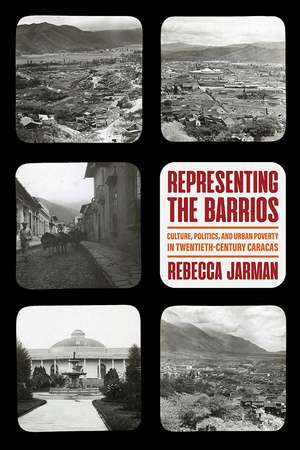Representing the Barrios: Culture, Politics, and Urban Poverty in Twentieth-Century Caracas: Pitt Illuminations
Autor Rebecca Jarmanen Limba Engleză Hardback – 9 mai 2023
Din seria Pitt Illuminations
-
 Preț: 301.57 lei
Preț: 301.57 lei -
 Preț: 338.21 lei
Preț: 338.21 lei -
 Preț: 388.79 lei
Preț: 388.79 lei -
 Preț: 386.88 lei
Preț: 386.88 lei -
 Preț: 389.76 lei
Preț: 389.76 lei -
 Preț: 433.53 lei
Preț: 433.53 lei -
 Preț: 349.43 lei
Preț: 349.43 lei -
 Preț: 347.87 lei
Preț: 347.87 lei -
 Preț: 462.86 lei
Preț: 462.86 lei -
 Preț: 428.75 lei
Preț: 428.75 lei -
 Preț: 390.71 lei
Preț: 390.71 lei -
 Preț: 426.79 lei
Preț: 426.79 lei -
 Preț: 310.95 lei
Preț: 310.95 lei -
 Preț: 243.01 lei
Preț: 243.01 lei -
 Preț: 384.00 lei
Preț: 384.00 lei -
 Preț: 322.67 lei
Preț: 322.67 lei -
 Preț: 394.94 lei
Preț: 394.94 lei -
 Preț: 391.67 lei
Preț: 391.67 lei -
 Preț: 428.36 lei
Preț: 428.36 lei -
 Preț: 390.71 lei
Preț: 390.71 lei -
 Preț: 356.55 lei
Preț: 356.55 lei -
 Preț: 386.88 lei
Preț: 386.88 lei -
 Preț: 386.88 lei
Preț: 386.88 lei -
 Preț: 396.85 lei
Preț: 396.85 lei -
 Preț: 358.46 lei
Preț: 358.46 lei -
 Preț: 290.58 lei
Preț: 290.58 lei -
 Preț: 388.79 lei
Preț: 388.79 lei -
 Preț: 426.63 lei
Preț: 426.63 lei -
 Preț: 423.14 lei
Preț: 423.14 lei -
 Preț: 389.55 lei
Preț: 389.55 lei -
 Preț: 385.91 lei
Preț: 385.91 lei -
 Preț: 384.00 lei
Preț: 384.00 lei -
 Preț: 385.69 lei
Preț: 385.69 lei -
 Preț: 425.86 lei
Preț: 425.86 lei -
 Preț: 386.88 lei
Preț: 386.88 lei -
 Preț: 423.91 lei
Preț: 423.91 lei -
 Preț: 422.76 lei
Preț: 422.76 lei -
 Preț: 427.55 lei
Preț: 427.55 lei -
 Preț: 386.88 lei
Preț: 386.88 lei -
 Preț: 386.88 lei
Preț: 386.88 lei -
 Preț: 390.71 lei
Preț: 390.71 lei -
 Preț: 428.75 lei
Preț: 428.75 lei -
 Preț: 386.88 lei
Preț: 386.88 lei -
 Preț: 438.33 lei
Preț: 438.33 lei -
 Preț: 386.88 lei
Preț: 386.88 lei -
 Preț: 350.79 lei
Preț: 350.79 lei -
 Preț: 384.92 lei
Preț: 384.92 lei -
 Preț: 460.97 lei
Preț: 460.97 lei -
 Preț: 385.91 lei
Preț: 385.91 lei
Preț: 459.98 lei
Nou
Puncte Express: 690
Preț estimativ în valută:
88.03€ • 91.56$ • 72.67£
88.03€ • 91.56$ • 72.67£
Carte disponibilă
Livrare economică 22 martie-05 aprilie
Preluare comenzi: 021 569.72.76
Specificații
ISBN-13: 9780822947653
ISBN-10: 082294765X
Pagini: 352
Dimensiuni: 152 x 229 x 33 mm
Greutate: 0.54 kg
Editura: University of Pittsburgh Press
Colecția University of Pittsburgh Press
Seria Pitt Illuminations
ISBN-10: 082294765X
Pagini: 352
Dimensiuni: 152 x 229 x 33 mm
Greutate: 0.54 kg
Editura: University of Pittsburgh Press
Colecția University of Pittsburgh Press
Seria Pitt Illuminations
Recenzii
“We can’t understand Venezuela today without understanding the barrios. Representing the Barrios provides an imaginary topography of the barrios of Caracas as both object of anxiety and historical subject, a space for radical politics and for the territorial remapping of political life more broadly. Moving effortlessly from literature to film to politics and back again, the book is ambitious, erudite, elegant, and essential.”
—Geo Maher, author of Anticolonial Eruptions: Racial Hubris and the Cunning of Resistance
“Jarman sheds urgent new light on one of Venezuela’s most important—and enigmatic—social actors: residents of Venezuela’s sprawling urban barrios. With equal parts theoretical sophistication, analytical insight, and narrative elegance, she digs deep into the country’s cultural landscape, finding in novels, chronicles, and film a subject that for over a century has at once been the source of elite angst and the nation’s potential redeemer, cast always either as threat or hero with little in between. Deftly walking us along that knife’s edge, Jarman does more than chart the literal and figurative fault lines of a country long polarized; she helps us imagine other possible landscapes.” —Alejandro Velasco, New York University
“The barrios of Caracas have played an outsized role in twenty-first-century Latin American politics. Before they were mythologized as the vanguard of a revolutionary movement, they were depicted as spaces of abject misery. In Representing the Barrios, Rebecca Jarman expertly traces the changing image of Venezuela’s urban popular sectors. This is a nuanced, insightful account of how the barrios were made to play the foil to Venezuela’s nation-building project; it is also an argument about why such representations continue to matter. An exceptional work of scholarship.” —Robert Samet, Union College
—Geo Maher, author of Anticolonial Eruptions: Racial Hubris and the Cunning of Resistance
“Jarman sheds urgent new light on one of Venezuela’s most important—and enigmatic—social actors: residents of Venezuela’s sprawling urban barrios. With equal parts theoretical sophistication, analytical insight, and narrative elegance, she digs deep into the country’s cultural landscape, finding in novels, chronicles, and film a subject that for over a century has at once been the source of elite angst and the nation’s potential redeemer, cast always either as threat or hero with little in between. Deftly walking us along that knife’s edge, Jarman does more than chart the literal and figurative fault lines of a country long polarized; she helps us imagine other possible landscapes.” —Alejandro Velasco, New York University
“The barrios of Caracas have played an outsized role in twenty-first-century Latin American politics. Before they were mythologized as the vanguard of a revolutionary movement, they were depicted as spaces of abject misery. In Representing the Barrios, Rebecca Jarman expertly traces the changing image of Venezuela’s urban popular sectors. This is a nuanced, insightful account of how the barrios were made to play the foil to Venezuela’s nation-building project; it is also an argument about why such representations continue to matter. An exceptional work of scholarship.” —Robert Samet, Union College
Notă biografică
Rebecca Jarman is associate professor of Latin American studies at the University of Leeds. Her research is situated at the intersections between culture and history in contemporary Latin America, and examines the forces, aspirations, and tensions that forge places, communities, and shared imaginaries in postcolonial and decolonial environments.
